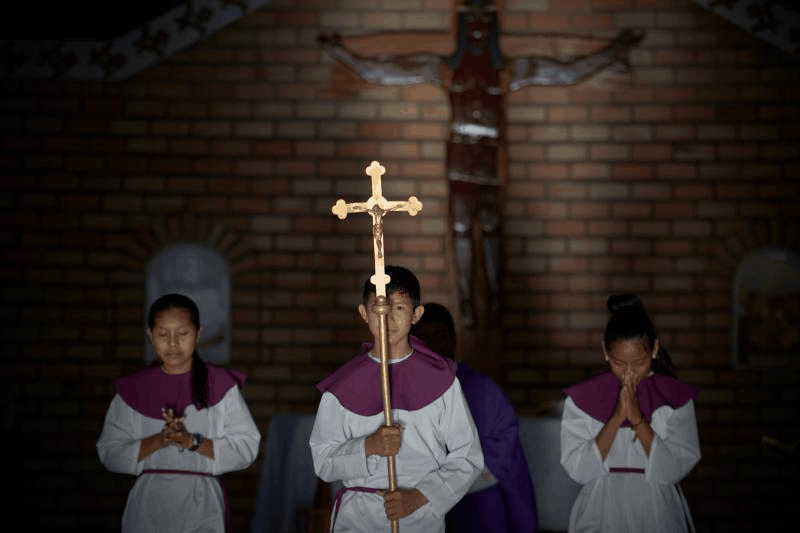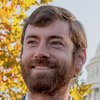Every morning as the sun begins to rise over the Kanuku Mountains just east of St. Ignatius Mission, twenty or so indigenous Guyanese faithful, from infants to elders, sit in their usual pews praying quietly. They all stand as Auntie Eva strikes the rusty metal cylinder that serves as a church bell. As Uncle Osmond begins to strum his guitar for the opening hymn, Father Edwin processes in, flanked by barefoot altar servers. These days it seems that these shy Amerindians might just be the Church’s newest inspiration for heresy.
At least, that is the impression you get if you have spent any time following the media coverage in anticipation of the Pan-Amazonian Synod. A vocal minority of prelates foment fears that an emphasis on inculturation and integral ecology in the synod’s working document represents the Church’s covert acceptance of pantheism, “eco-tribalism,” and a variety of other post-modern heresies. Still others worry that the secret purpose of the Synod is to ordain married men.
Whether you find yourself responding to these possibilities with worry or welcome, you have already missed the point. Though the issues surrounding the ordination of so-called viri probati are significant, they are not, as Pope Francis has made clear, the primary theme of the Amazon Synod. Neither is pantheism. So, what then – or rather whom – is the Synod about? The cacophony of ideological crusaders in the global North? Or the voices of the poor and indigenous in the global South?
At its very heart, the Synod is about the people of the Amazon: “It is the peoples of the Amazon, especially the poor and culturally different, who are the main interlocutors and protagonists of the dialogue” (Instrumentum laboris (IL), 38). It is about faithful Catholics, people just like those whom I encountered at St. Ignatius Mission and throughout Guyana. During my three months working alongside Jesuit missionaries there, I listened to the stories and concerns of indigenous elders who see their cherished languages and cultures disappearing as their grandchildren are consumed by the latest Marvel movie on their smartphones. I met fishermen who, because of mercury contamination by mining companies, are now afraid to eat what they catch. One parishioner of St. Ignatius told me with a disheartened sigh how the entire village used to meet down at the river each day to wash their clothes, bathe, and collect drinking water. Now trash and the allure of new technologies keep people away. I worshiped with communities who see a priest only a few times per year yet still faithfully gather every Sunday to pray together. I listened to young people who, desperate for work, leave behind the familiarity of their native villages for foreign cities. These represent just a sampling of the daily concerns of Amazon residents as the forces of globalization and environmental degradation rattle their lives and their faith.
If the people of the Amazon are the key voices of the synod, then discernment is the modus operandi. As a Jesuit, Pope Francis knows this well and recognizes that, for good discernment to happen, the Church must listen. He has made this evident in his emphasis on a more synodal approach: “The Synod of Bishops must increasingly become a privileged instrument for listening to the People of God: ‘For the Synod Fathers we ask the Holy Spirit first of all for the gift of listening: to listen to God, that with him we may hear the cry of the people; to listen to the people until breathing in the desire to which God calls us.” Addressing the indigenous peoples of the Amazon, Pope Francis said, “It is good that now you are the ones who define yourselves and show us your identity. We need to listen to you.” When we listen to one another, we sense the movements of the Holy Spirit at work in the Body of Christ.
This intentional listening requires bringing those who are on the periphery to the core of our discourse. We have an aversion, however, to listening. After five centuries of colonialism, it is not surprising that North Americans and Europeans fail to listen humbly to our brothers and sisters in the Amazon. The interaction between North and South has been wrought with exploitation and dehumanization of the periphery by those who live comfortably at the core.
In contrast, dialogue will break down this system that is shaped by “lack of listening and imposition that prevents us from meeting, communicating and, therefore, living together,” (IL, 36). With the synod, the Church “has the historic opportunity to differentiate itself clearly from the new colonizing powers by listening to the Amazon peoples,” (IL, 7.) By amplifying the voices of the Church in the Amazon, the synod seeks to transform “historical relationships marked by exclusion and discrimination” (IL, 35) into bonds of true human solidarity, a recognition that as St. John Paul II wrote, “we are all really responsible for all.”
If we shift our attention to the voices of those on the margins, only then we will start to recognize who they are and the possibility for something greater. Instead, we have fixated on our own concerns; we have made the synod about us, the residents of the global North. But it should be about a different us: the Body of Christ. St. Paul tells us:
Indeed, the parts of the body that seem to be weaker are all the more necessary, and those parts of the body that we consider less honorable we surround with greater honor, and our less presentable parts are treated with greater propriety, whereas our more presentable parts do not need this. But God has so constructed the body as to give greater honor to a part that is without it, so that there may be no division in the body, but that the parts may have the same concern for one another. If [one] part suffers, all the parts suffer with it; if one part is honored, all the parts share its joy. (1 Cor. 12:23-26).
Each morning the same sun rises over the Kanuku Mountains just east of St. Ignatius Mission, and the faithful gather again to share in the one Body. I left Guyana and its people months ago, yet I still hear their voices and know their faces in the Body of Christ that we all share. Although I said that the Synod is about the Church in the Pan-Amazon region, that was not the whole truth. It is about us: all of us.


